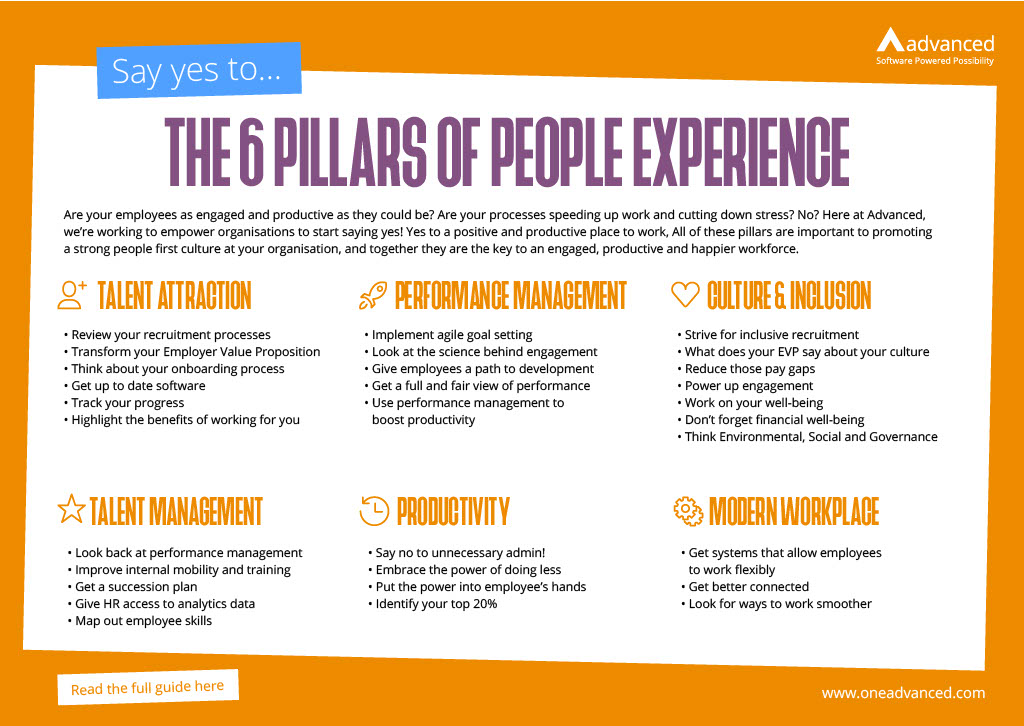Can you afford to ignore your people experience?
- 6 Min Read
HR exists in a rapidly evolving world and what determines a successful organization and what employees demand of their workplaces, has undergone an accelerated transformation in recent years- one where the people experience has a huge role to play. Managing director of Advanced People Management, Nick Gallimore, explores the six pillars of people experience and the benefits that businesses can unleash when they focus on them.
- Author: Nick Gallimore
- Date published: May 16, 2023
- Categories

Regardless of the sector you operate in, HR’s natural instinct can often be to fall back on old habits and ways of working. We are in a rapidly evolving world and what used to distinguish top organizations from the rest of the pack- a focus on large and impressive office spaces and salary offerings, for example, does not necessarily hold true anymore.
Employees are increasingly demanding more from the organizations they work for, particularly to act as empathetic and considerate leaders, in essence, the very stuff your people experience is founded upon. Businesses that shy away from the reality of these changes run the risk of actively degrading the people experience of their employees.
At Advanced, we believe in encouraging people management teams to embrace the possibilities that come with focusing on their people experience. In this article, we will introduce the six key pillars of the people experience and the transformative effect of focussing on each one of these priorities, and what it can achieve not only for your people experience but for your business performance as well.
Talent attraction
Recruitment is a hefty investment. It costs you time sourcing candidates, and it costs organizations even more in financial terms- especially when new hires do not work out in the long run.
These factors go a long way towards convincing businesses that the inefficiencies and the headaches associated with recruitment are just an inherent part of the process. The question I wanted to pose to you is have you actually taken the time to consider how reliance on outdated hiring methodology could be effectively hamstringing your abilities to secure the very talent you need to drive success in the future?
We think that the answer is taking a focused approach instead. Identify the gaps in your organisation and focus on hiring individuals with the specific qualities you need to attain your goals.
A people experience-led approach to talent acquisition also allows your employee value proposition (EVP) to come to the fore. Being able to articulate your value as an employer offers you the ability to distinguish yourself in fiercely competitive job markets.
 Talent management
Talent management
As with talent attraction, talent management and employee programmes of learning and development often find themselves victims of outdated thinking.
Have you stopped to consider the reasons why organizations fall into these patterns or do we make these decisions purely because that is how things have been done traditionally? How does deprioritizing a demand amongst your people for continued growth and learning impact them and your organization in the long run?
Engage with employees from day one of their journey with you and drive conversations around their aspirations- ask them where they see themselves within the organization. Let them drive the conversation and use that information to build a program of development tailored to their needs.
Performance management
We understand how easy it is for performance reviews to become seen as an admin headache- a box-ticking exercise that requires us to grit our teeth and get on with. Have you ever taken the time to consider what you’re measuring or how the information gleaned from employee reviews can help benefit both the organisation and its people?
If your performance management processes follow a rigid schedule, ask yourself why? If appraisals occur annually, what shifts in mood or loss of engagement are you missing out on in those intervening months?
Challenge the orthodoxy and don’t just restrict you and your people to annual reviews simply because everyone else does it that way- this is your opportunity to be bold and break out of rigid patterns which are preventing you from gaining meaningful insight into the mood of your people.
Productivity
We certainly do not need to tell you that day-to-day people management responsibilities carry with them a huge amount of administrative responsibilities. In fact, one of the main reasons we see organizations undergo projects of digital transformation is to help tackle these burdens.
What is less commonly thought of however is the wider benefits that can be won from overcoming administrative hurdles. Your time is valuable yes but what you do with that time is worth its weight in gold.
Productivity in people management is about more than just hitting KPIs. At Advanced, what we always like to consider is the power of possibility- doing more with less. If your people teams can free themselves from box-ticking exercises, consider how they can leverage their talents in creating strategies that help support your workforce and transform your people experience for the better.
Culture and inclusion
A diverse and welcoming workplace culture should be an aspiration for any business. Unfortunately, it is all too easy for any initiatives designed to foster culture and inclusivity to be deprioritised in the face of wider business demands
Being able to demonstrate that your organization values diversity and inclusion is a vital tool in your arsenal when it comes to talent attraction and performance.
Understanding what makes your organization a great place to work for is beyond important when looking to communicate your culture to potential new hires. Engage with your current employees and gain an understanding of why they enjoy working for you and consider how you can bring those qualities to the forefront.
Modern workplace
HR is a rapidly evolving space and today’s challenges and considerations will vary differently from those which have come before. Reconciling key day-to-day responsibilities with the need to foster a workplace which is sympathetic with current values is likely one of the most dominant challenges facing you.
A key element of the people experience is an organisation’s ability to reflect the wants and needs of their employees. Again, this is an element of the people experience that you can’t afford to ignore. The ongoing debate around hybrid working and the pushback we’ve seen when organisations try to impose their will should tell you that the voice of your people should be a powerful decision-making tool.
Are you engaging with your people? Are you offering them a framework to express their opinions? Are you actively using that feedback to build a setup which works for your people?
We hope this has been an inspiring look at how focusing on the six key pillars of the people experience can transform your business, especially in times of crisis.
A note I want to leave things on is that HR is fast moving and success will be determined by an ability to adapt. Simply put, organisations who lose sight of their people experience will lack the key insights needed to drive meaningful change.
If you would d like to find out more detail about how the six pillars and the practical steps you can take to begin your journey of transforming your people experience, read our eBook now.








